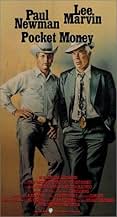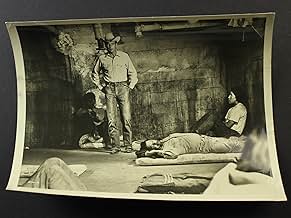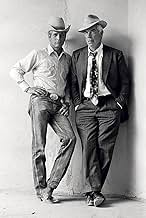AVALIAÇÃO DA IMDb
5,4/10
2,1 mil
SUA AVALIAÇÃO
Falido e endividado, um cowboy honesto se envolve em negócios obscuros com um fazendeiro corrupto.Falido e endividado, um cowboy honesto se envolve em negócios obscuros com um fazendeiro corrupto.Falido e endividado, um cowboy honesto se envolve em negócios obscuros com um fazendeiro corrupto.
- Direção
- Roteiristas
- Artistas
Gregory Sierra
- Chavarin
- (as Gregg Sierra)
Bruce Davis Bayne
- Bank Customer
- (não creditado)
Poupée Bocar
- Girl in Bar
- (não creditado)
Richard Farnsworth
- Man
- (não creditado)
Ken Freehill
- Bank Customer
- (não creditado)
Terrence Malick
- Worksman
- (não creditado)
- Direção
- Roteiristas
- Elenco e equipe completos
- Produção, bilheteria e muito mais no IMDbPro
Avaliações em destaque
Throughout this thoroughly confused movie, I kept waiting for the point to become clear. Is it an innocent cowboy against the the corrupt cattle barons movie? Is it a buddy movie? A character study? What's the point?
Paul Newman seems to be playing a slightly retarded rancher, with an accent that is neither consistent nor believable. Lee Marvin plays the only character that is at least interesting, even though it's not at all clear just what his purpose in the movie is. Strother Martin is just painful to watch.
Mexicans may want to avoid this movie. It contains enough slurs to keep the producers in law suits for a decade if it had been produced in the more politically correct 90's.
It was a struggle to stay awake through this movie. I sure hope the book was better.
Paul Newman seems to be playing a slightly retarded rancher, with an accent that is neither consistent nor believable. Lee Marvin plays the only character that is at least interesting, even though it's not at all clear just what his purpose in the movie is. Strother Martin is just painful to watch.
Mexicans may want to avoid this movie. It contains enough slurs to keep the producers in law suits for a decade if it had been produced in the more politically correct 90's.
It was a struggle to stay awake through this movie. I sure hope the book was better.
A low-key and wry modern-day western from the early-'70s. Filmed in Arizona and Northern Mexico in the spring and early summer of 1971 and shown in cinemas in that most downbeat of hippy years -1972: it records the 'feel' of the early-'70s which were pioneering years so well. Jim Kane (good-looking blue-eyed US actor Paul Newman) is a naive, broke and in debt cowpoke i.e. An everyman and loser. Needing the money, he agrees to work for a pair of crooked rodeo cattle dealers -Bill Garrett (Strother Martin) and Stretch Russell (Wayne Rogers) who hire him to squire 250 steers from Mexico to Arizona. Kane locates his equally broke buddy Leonard (Lee Marvin) in a Mexican hotel room and the two undertake the imprudent business venture with failed results marked by their inability to make astute decisions. The inner rhythm of the film is strange, languid and existential with Beckettian undertones. It features some great scenes - the sun-bleached urban aesthetics of Nogales, Phoenix, Chihuahua and Hermosilla and the enchanted and evocative interior scenes featuring exotic Mexican bordellos, bars, mariachi/rock and roll musicians, street hucksters etc plus the barren cattle lands of Northern Mexico and the Mexican transport/rail infrastructure ca. '71-72 all recorded by ace Hungarian cameraman Laszlo Kovacs. Leonard - who sports white hair, a 'Forties style suit, fedora hat and jazzy tie in one scene is seen imbibing olives, fajitas, tacos, chili and the Cuervos-brand of tequila. Pocket Money is in my top ten films of all time.
Down-on-his-luck Arizona cowboy takes a job herding cattle through part of Mexico. Adaptation of J.P.S. Brown's novel "Jim Kane" is oddly benign, certainly not a strong acting vehicle for Paul Newman, who is likable but curiously dopey throughout, nor Lee Marvin as Newman's equally half-witted cattle-broker pal. Eccentric ambiance abounds (this is no "Hud"), yet director Stuart Rosenberg gives the picture a scruffy charm in a light lower key. The plot is too skimpy for these characters to truly come alive, but it's a pleasant enough throwaway. Screenplay by future filmmaker Terrence Malick, from an original treatment by John Gay. ** from ****
Caught this one on American Movie Classics, thinking that a Lee Marvin / Paul Newman pairing couldn't be all bad. Indeed, it wasn't all bad, but it was no great success either. A premise with possibilities for interesting developments never seems to play out in a fruitful manner. The Marvin / Newman interaction is indeed the main redeeming factor of the film, along with evocative cinematography, but ultimately the movie never seems to go anywhere in particular, and indeed it does not end - it just all of a sudden stops. I have rarely seen such an abrupt and unsatisfying conclusion - all of a sudden we are seeing the closing credits and wondering "what happened?" Unfortunately, this can only be recommended to diehard fans of Lee Marvin &/or Paul Newman. (Incidentally, "Maltin's" remark that Marvin's car is "the damnedest thing you'll ever see" indicates he was not alive in 1960, the model year this particular Buick was a common sight on the roads of America)
This film is not as bad as the previous reviewer would have you believe. It just takes a different kind of mindset to enjoy it--you have to like nonlinearality. You have to be in a relaxed, maybe even coming-down-off-a-jag state of mind to appreciate its structure.
Paul Newman, affable as always in the lead, is not placed in any of the more familiar predictable, and simplistic predicaments cited by my colleague ( though, if anything, "character study" would come the closest to describing this film).
But, instead of an "easy" situation--the kind that makes us smug to be able to identify quickly--in this picture Newman battles ineffectually against a more subtle and insidious malaise, one not often focused on in film in this manner. Its a common problem--something we all deal with at one time or another--its that type of confidence-effacing, will-sapping, ego-draining personal economic debt that for many adults never really seems to go away.
Just like the rest of us, Newman's simply got an ego that wants to assert itself--but at every turn he's being strung up by the short-and-curlies due to lack of $$. He keeps trying however. Still, we see that throughout the film, each new situation somehow gets away from him and leaves him with nothing to show for his troubles. He's just too nice a guy to come out a winner.
He always needs more money than he's got and it affects everything he does--prevents him from really enjoying what might be an otherwise pleasant life. In the end he's forced to face that:
1) his troubles are maybe never going to be conquerable,
2) there will be a lot more (of the same kind of humiliation he's undergone all throughout the movie)throughout the rest of his life, and 3) despite this, there are still some dividends in life that make things easier to bear, like having a best friend, a car that runs, or just having enough money in your pocket to get a Coke.
Its true the movie has an unsatisfying conclusion--the very human plot in this film just doesnt have a happy resolution, (coincidentally, just the way real-life problems dont work out, what a concept for a film, right?).
But the hangdog ending, just like the rest of the film, is somehow difficult to forget. It has such an unusual, low-key pace and rhythm that it really stays with you. I have seen it come up at least 4-5 times on the late show and never been displeased--its rather like seeing an old friend.
Dont dismiss it--its a movie that can cheer you up under the right circumstances.
Paul Newman, affable as always in the lead, is not placed in any of the more familiar predictable, and simplistic predicaments cited by my colleague ( though, if anything, "character study" would come the closest to describing this film).
But, instead of an "easy" situation--the kind that makes us smug to be able to identify quickly--in this picture Newman battles ineffectually against a more subtle and insidious malaise, one not often focused on in film in this manner. Its a common problem--something we all deal with at one time or another--its that type of confidence-effacing, will-sapping, ego-draining personal economic debt that for many adults never really seems to go away.
Just like the rest of us, Newman's simply got an ego that wants to assert itself--but at every turn he's being strung up by the short-and-curlies due to lack of $$. He keeps trying however. Still, we see that throughout the film, each new situation somehow gets away from him and leaves him with nothing to show for his troubles. He's just too nice a guy to come out a winner.
He always needs more money than he's got and it affects everything he does--prevents him from really enjoying what might be an otherwise pleasant life. In the end he's forced to face that:
1) his troubles are maybe never going to be conquerable,
2) there will be a lot more (of the same kind of humiliation he's undergone all throughout the movie)throughout the rest of his life, and 3) despite this, there are still some dividends in life that make things easier to bear, like having a best friend, a car that runs, or just having enough money in your pocket to get a Coke.
Its true the movie has an unsatisfying conclusion--the very human plot in this film just doesnt have a happy resolution, (coincidentally, just the way real-life problems dont work out, what a concept for a film, right?).
But the hangdog ending, just like the rest of the film, is somehow difficult to forget. It has such an unusual, low-key pace and rhythm that it really stays with you. I have seen it come up at least 4-5 times on the late show and never been displeased--its rather like seeing an old friend.
Dont dismiss it--its a movie that can cheer you up under the right circumstances.
Você sabia?
- CuriosidadesThe movie's publicity still with Paul Newman and Lee Marvin was photographed by British photographer Terry O'Neill and also appears on the jacket of O'Neill's 2003 compilation coffee-table book "Celebrity." In the book, O'Neill recounts how when he arrived on the set to shoot his publicity stills, Lee Marvin was hungover and in a foul mood. Most of the production personnel were steering clear of him. When O'Neill gingerly approached Marvin and introduced himself, Marvin asked, "Are you English?" What O'Neill didn't know at the time was that Marvin was a lifelong Anglophile--he LOVED the British. After that brief encounter, Marvin's mood changed and, according to O'Neill, he couldn't have been more cooperative for the rest of his assignment.
- Erros de gravaçãoJim asks Adelita if she's ever been out of the country, and she says she's only been to a Catholic school in San Antonio. Yet she has a thick, mid-Atlantic, prep-school accent, without a trace of the south or Spanish in it.
- ConexõesFeatured in Hollywood Remembers Lee Marvin (2000)
- Trilhas sonorasPocket Money
Written and Performed by Carole King
Principais escolhas
Faça login para avaliar e ver a lista de recomendações personalizadas
Detalhes
Bilheteria
- Orçamento
- US$ 2.700.000 (estimativa)
- Tempo de duração1 hora 42 minutos
- Mixagem de som
- Proporção
- 1.85 : 1
Contribua para esta página
Sugerir uma alteração ou adicionar conteúdo ausente

Principal brecha
By what name was Meu Nome é Jim Kane (1972) officially released in India in English?
Responda

































